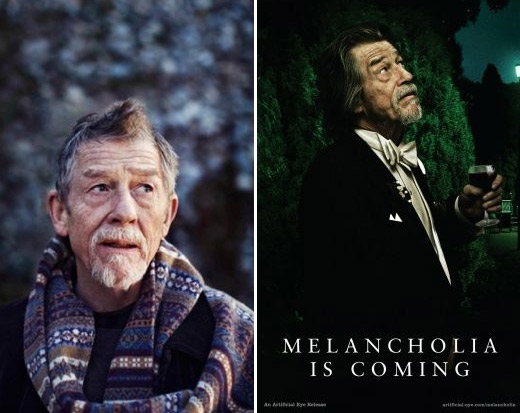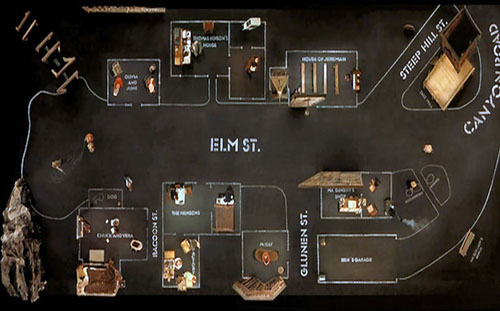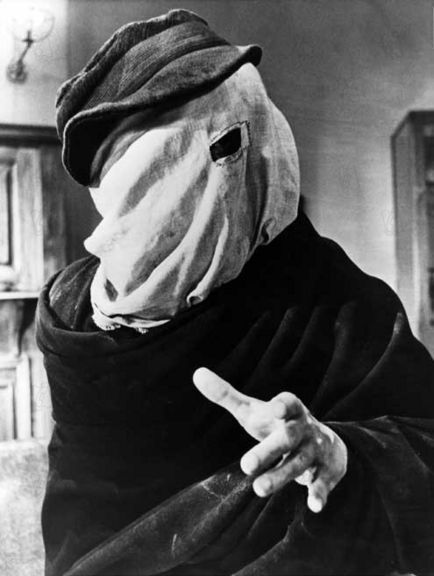Take Three: John Hurt
 Tuesday, April 17, 2012 at 12:00PM
Tuesday, April 17, 2012 at 12:00PM Craig here with the third season of Take Three. Today: John Hurt

Take One: Brighton Rock (2010)
Hurt has alternated starring roles with supporting performances since he began acting in films with The Wild and the Willing in 1962. The amount of quality supporting turns he’s delivered over the years is vast: 10 Rillington Place, Midnight Express, The Shout, The Hit, Scandal, The Field, Contact, The Proposition, Melancholia, Tinker Tailor Soldier Spy are a mere few. His fine turn as accountant Phil Corkery in the Brighton Rock remake (backing up Helen Mirren, Sam Riley, Andrea Riseborough and Andy Serkis) is a recent solid addition to the list and deserves due credit. Phil’s a gaunt shambles, but loyal to Mirren’s Ida, his long-time crush. He’s one of the old guard. A proud man accustomed to propping up bars whilst waxing forth about the state of the world. He’s the kind of bloke who changes his bow tie each day but wears out the same coat and pork-pie hat. Hurt blusters when faced with the criminal element, but in his staunch moral belief and touching devotion to Ida he comes through. Hurt’s on the sidelines for much of the time, but it’s to his credit that he’s still willing to, at this later stage in his career, take small parts when he believes in the material. He adds a nod of class to the film. That he gives us a characterful turn in only a handful of scenes – a minor glimmer amid a career of solid gems – owes much to his mastery of screen acting.
Take Two: Dogville (2003) with a nod to Manderlay (2005)
We don’t see Hurt in Dogville. But I wouldn’t blame anyone for thinking that they recall him being in it – so vivid is his contribution to Lars von Trier’s polemic-play.

He’s the narrator of events at Kidman’s damned mountain hideout, a disembodied stream of words. He's a sage, an all-knowing set of omniscient vocal chords from above (and he is above, isn’t he?). Yet he’s an intrinsic part of the film as its voice, conveying the fabric of the town. From the opening moments he smoothly introduces us to the inhabitants of von Trier's alloegorial enclave yet he does so with just the tiniest creakiest sliver of alarm. Dogville was an inventive stage-bound tale and Hurt the vocal master of ceremonies relaying to us the trials of the belligerent lives treading the chalk-outlined boards. Maybe ol’ Lars saw Roger Corman’s Frankenstein Unbound (deftly narrated by, and starring, a sly Hurt) prior to choosing his Dogville storyteller. Or maybe – I prefer to think – he saw 2000’s The Tigger Movie (deftly narrated by a cuddly Hurt). Either way, Hurt’s narrator combines the shrewdness of a learned professor and the wise experience of a well-travelled uncle. It may seem a slight cheat to include Hurt’s throat work in Dogville, but his was the key, albeit invisible, performance. He may not have been in every scene, but he was within them; the thread binding Dogville together.
 Take Three: The Elephant Man (1980)
Take Three: The Elephant Man (1980)
Hurt and David Lynch set a particularly high bar for cinematic portrayals rich in tender empathy with The Elephant Man. It was brought about thanks to Mel Brooks’ love of Eraserhead, given its own surreal signature by Lynch’s astute direction, and completed by Hurt’s compassionate performance as ill-fated circus act John Merrick. His BAFTA winning and Oscar-nominated performance is rightly regarded as one of the best of the ‘80s. The performance's initial impression are made through a distorted middle-class accent, a laboured walk and a cloth bag covering his head which itself is shaped in elephantine fashion. But as the film continues it becomes a fully embodied performance.
Hurt plays beautifully off the facial reactions of his fellow actors: Anthony Hopkins, Hannah Gordon, Anne Bancroft and John Gielgud all convey various concerns that we as an audience are also experiencing. A great deal of Hurt's power in the role comes through his ability to create heart-rending drama through poignant interaction. Hurt's palpable delight at 19th Century niceties as Merrick revels in the elegance of high society is captivating. We’re with him in his discovery of refinement and eventual acceptance, so that when, as his condition dictates, he succumbs to inevitable death our feelings go beyond sadness into near empathic despair.
At the halfway mark Merrick sees a drawing of a child sleeping and forlonly turns to Anthony Hopkins' Treves.
Merrick: I wish I could sleep like normal people. Can you cure me?
Treves: No. We can care for you but we can't cure you.
Merrick: No, I thought not."
This last line comes without fuss or delay but with only a dreadful knowing. Hurt creates in Merrick a refined man of wonder -- it’s the age itself that's ugly. The Elephant Man is a heartbreaking experience every time. Now, ‘scuse me, I appear to have something in my eye...
Three more films for the taking: Alien (1979), Love and Death on Long Island (1997), V for Vendetta (2006). Previously on Take Three: Melissa Leo
 Brighton Rock,
Brighton Rock,  Dogville,
Dogville,  John Hurt,
John Hurt,  Oscars (80s),
Oscars (80s),  Take Three,
Take Three,  The Elephant Man
The Elephant Man 

